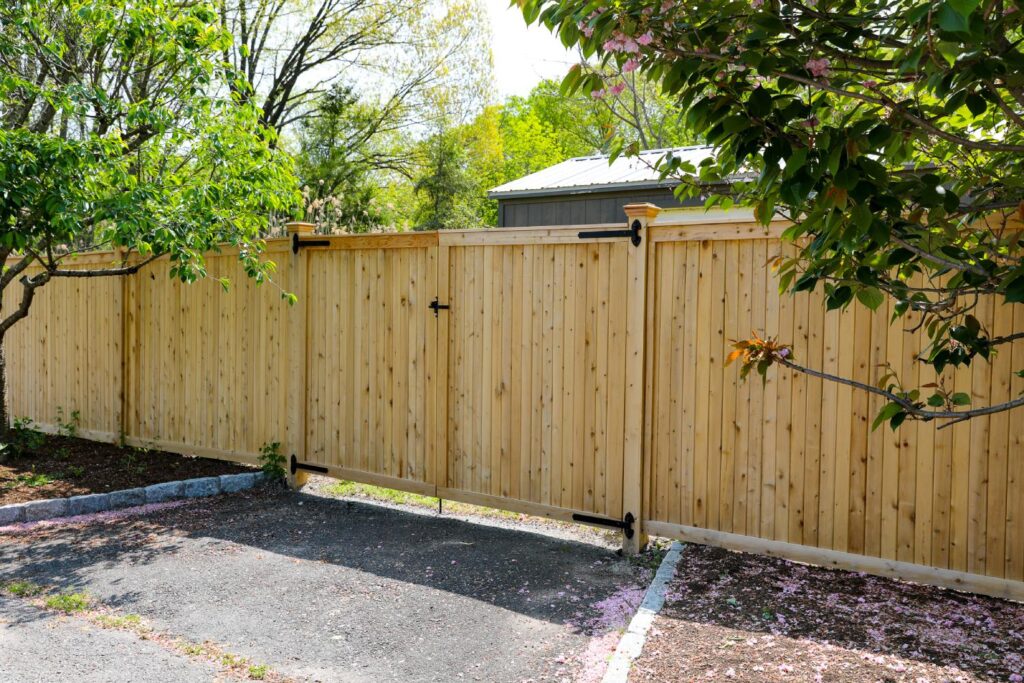All Categories
Featured

When it comes to selecting the appropriate fencing product for your property, plastic, timber, and light weight aluminum are among one of the most prominent choices. Each product uses distinct benefits that fit different demands, choices, and budget plans. Recognizing the pros and cons of each kind can assist you make a notified decision based on your concerns, whether that's visual appeal, longevity, or upkeep needs. Listed below, we damage down the benefits and downsides of these three usual fence materials.
Wood Fence. Pros:
Visual Allure: Wood fencings offer an all-natural, traditional appearance that complements most kinds of landscaping and style. They can be quickly customized with paint or discolor, giving you the liberty to develop the excellent shade and finish for your property. Convenience: Wood can be used to create a variety of fencing designs, from typical picket fencings to much more modern layouts like personal privacy fencings or rustic ranch-style fences. If your demands transform, it's easy to add or change to over time. Price: Wood is normally much more budget-friendly than plastic or light weight aluminum, making it an attractive option for home owners on a budget. The initial price of a timber fencing is usually less than the other materials. Cons:

Upkeep Requirements: Wood fences need routine maintenance, consisting of staining, securing, or painting to secure them from weathering, rot, and pest damages. Without appropriate treatment, wood can deteriorate quickly. Longevity: Wood is susceptible to harm from pests like termites, and it can warp, crack, or split with time as a result of exposure to the aspects. In areas with extreme weather, wood may require to be changed much more regularly than other products. Limited Life expectancy: While timber fencings can last for several years with appropriate care, they usually have a shorter life expectancy than plastic or light weight aluminum fencings. Plastic Fence. Pros:
Low Upkeep: One of the largest advantages of plastic fencing is its low upkeep demands. Unlike timber, plastic doesn't require to be painted, stained, or secured. It's immune to fading, breaking, or bending, making it excellent for property owners who desire a hassle-free fencing. Durability: Vinyl fencings are resistant and extremely resilient to the components, including UV rays, rain, and moisture. They're additionally unsusceptible parasites, such as termites, that can harm timber fences. Selection of Styles: Plastic fences can be found in a wide array of shades and styles, and lots of resemble the look of timber without the upkeep disadvantages. You can select from personal privacy fencings, picket fences, and even more to suit your needs. Lengthy Lifespan: With proper care, vinyl fencings can last decades, much longer than timber fences, and they feature guarantees that supply comfort. Disadvantages:
Higher Preliminary Expense: While vinyl fences can conserve money on upkeep for many years, they have a tendency to have a greater in advance expense than wood fences, which may be a deterrent for some purchasers. Limited Customization: While vinyl fencings are offered in a selection of shades and designs, they lack the personalization adaptability that timber offers. You're restricted to the pre-designed panels offered, which could not match every distinct aesthetic. Potential for Splitting in Cold Climates: In severe cold temperatures, vinyl fences can come to be breakable and may break under influence, making them less suitable for locations with freezing winters. Aluminum Fencing. Pros:
Resilience and Toughness: Aluminum is a light-weight yet strong product that resists rust and deterioration, making it suitable for seaside areas or locations with high humidity. Aluminum fencings require very little maintenance and can hold up against the aspects for several years. Visual Allure: Aluminum fences use a sleek, modern-day appearance. They come in a variety of decorative designs and can be used to develop a much more stylish or contemporary appearance for your home. Reduced Maintenance: Light weight aluminum fencings do not need paint or securing, and they're immune to corrosion and rust, making them incredibly reduced upkeep with time. Safety: Light weight aluminum fences supply a higher level of protection compared to vinyl or timber fencings as a result of their strong building. They can be geared up with locks and gates to provide a safe limit around your residential or commercial property. Cons:

Expense: Light weight aluminum fences are often extra expensive than timber or plastic fencings, both in regards to products and installment prices. This greater price point can be a disadvantage for budget-conscious home owners. Less Personal privacy: Aluminum fencings usually have a more open style, with pickets spaced apart to permit exposure through the fencing. If personal privacy is a priority, this may not be the most effective option for your residential or commercial property. Prone to Denting: While light weight aluminum is rust-resistant, it can still be dented or bent if struck with force, such as by an automobile or heavy equipment. While it won't rust, it may not keep its pristine appearance if it obtains damaged. Which Product is Right for You? Selecting the ideal fencing product depends on your specific needs, budget, and long-lasting strategies for your building. If you value aesthetic customization and are prepared to preserve it frequently, timber might be your best option. Vinyl can be the perfect remedy if you favor low-maintenance longevity and are prepared to spend a bit much more in advance. On the other hand, if you require a durable, safe and secure fencing with a streamlined look, aluminum might be the best material for you.
Ultimately, consider your climate, upkeep preferences, and aesthetic needs when selecting your fence material. Each alternative has its weak points and staminas, yet with the right treatment and installation, all 3 can give trusted and eye-catching borders for your home.
Latest Posts
Find Affordable Auto Repairs with Montclare’s Exclusive Service Specials
Published May 26, 25
1 min read
Discover the Perks of Vinyl Fencing with Montana Fencing
Published May 21, 25
1 min read
Specialist Industrial Roof Solutions in North Platte, Nebraska
Published May 20, 25
2 min read